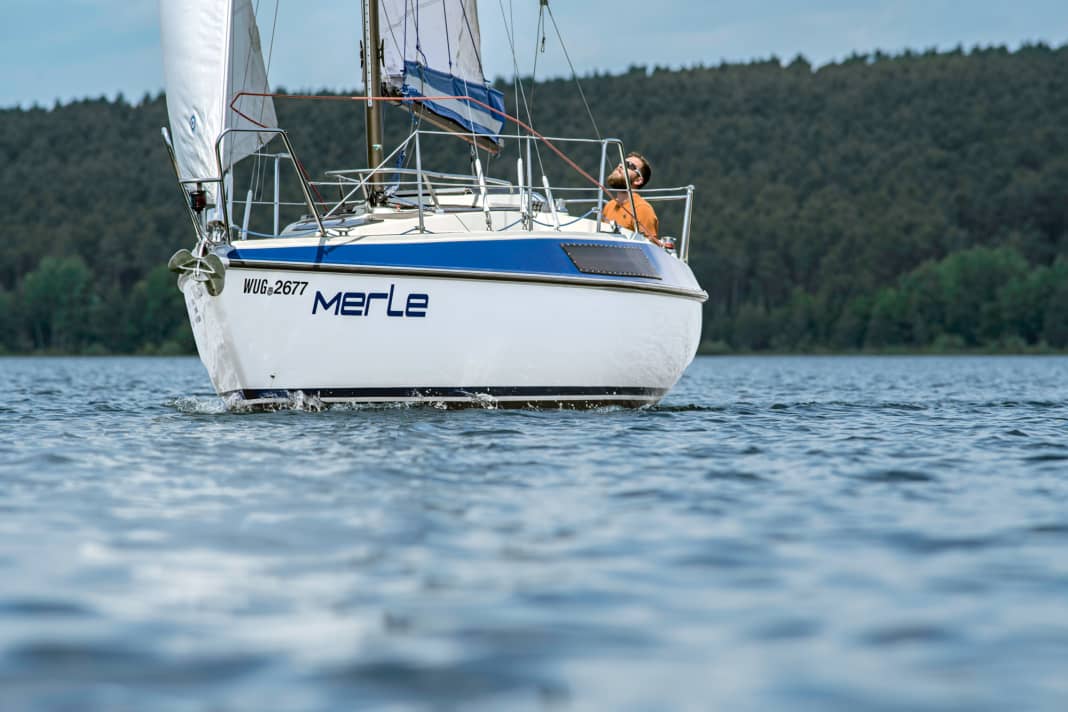





The first thing that owner Kevin Müller noticed when he launched his newly acquired second-hand yacht was its stability. "The Bavaria is much less slender than my old Varianta," Müller is still pleased today. His previous boat, the epitome of the burgeoning series yacht building of the 1970s, sold almost four thousand times, has very little initial stability. Cruising with this boat meant tippy camping on the water. The Bavaria 707, on the other hand, was considered to be a stable caravan.
The new launch from Giebelstadt was also probably the first German production yacht with a designer hired specifically for the interior. From today's perspective, the cabin is dark, but contemporary: teak furniture was the measure of all things in living rooms back then. From this perspective, the Bavaria is cosy. "And it has a lot of storage space, there was much less on the Varianta," says the owner.
The Bavaria 707 was the antithesis of the sporty Dehler
His Varianta was a Corona sponsored purchase for just under seven thousand euros; Müller bought her in March 2021 without sailing her on land in driving snow. As soon as he set sail for the first time, Müller noticed how quickly the boat heeled, which didn't please him, his wife or their dog Emma. However, as this did nothing to dampen his passion for sailing, it was clear that another boat was needed.
Dehler and Bavaria were the antipodes of inland sailing in the 1980s. In the West, the Dehler yachts from Freienohl in Westphalia dominated. These were sport-oriented boats, such as the Varianta. Dehler's in-house designer was the Dutchman Rico van de Stadt, a regatta freak by background.
But the south and Berlin were Bavaria territory. The owner of the shipyard at the time, Winfried Herrmann, couldn't sail himself. Until the first Bavaria, the 707, was built, he had run a window manufacturing business with two hundred employees. The switch to yacht building began in 1978 with the Bavaria 707, after Mr and Mrs Meltl joined the company, which had previously been active as a yacht dealer and charter broker.
"The dinette layout appealed to housewives, who had to be on the boat." Looking back today, Dorothea Meltl explains the expansion concept: "The 707 turned out to be a big seller." But first, she and her husband Josef invested their entire fortune in the window manufacturers' shipyard, which was initially threatened with bankruptcy. Meltl had once set up her own business selling counter displays for tights and from then on practised selling. It was always about "talking to people". And Meltl's down-to-earth attitude also helps him in the yacht industry.
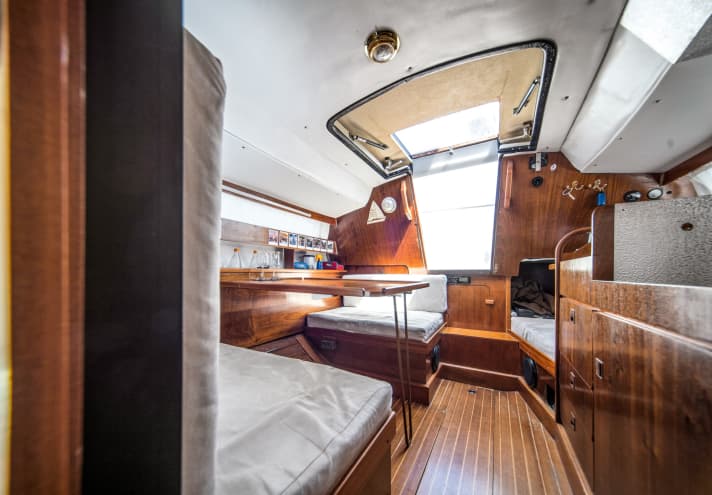
Thirty years after these beginnings, Bavaria realised over one billion euros when it was sold. An exemplary company history. "It was crazy," Josef Meltl said in the "Yacht" interview, "how many bankers were sitting opposite us. I didn't even understand half of what they were saying."
The dinette made the Bavaria 707 a bestseller
Kevin Müller bought his Bavaria 707 for around 9000 euros. He was able to find information about the boat type in advance in an old issue of YACHT. "In our opinion, the interior layout is not optimal," was how tester Georg Nissen assessed the dinette at the time, which later proved to be a bestseller. The workmanship, deck layout and sailing characteristics, on the other hand, fully satisfied the testers.
On the test day, Müller's example of Bavaria's first boat is taken across the Brombachsee. The boat lies comfortably on the rudder, but turns agilely - the designer had dispensed with a skeg. Back then, this was emphasised and hardly welcomed.
The boat does not run very high, but the sails are also original, i.e. original equipment. At the time, the tester was impressed by the deck covering. It is now crumbling and tops Kevin Müller's refit list. In a few weeks, the trailer will be travelling to Corsica, and by then the owner would like to have the deck recoated with elastic plastic.
Only the bare essentials are on board for winches and fittings
But his to-do list is even longer. A 200-watt solar panel on the lifting roof, which can also be hung on the railing, will provide power for a cooling drawer. Müller also wants to retrofit four self-tailing winches instead of the conventional Lewmar models and also bolt on larger cleats. YACHT tester Georg Nissen had already criticised these as being too small. The same applies to the fittings. The blocks and clamps came from established manufacturers such as Sprenger in Iserlohn and Nemo in Italy. The shipyard had not skimped here, but only equipped the bare essentials, as the boats themselves were extremely affordable compared to the competition from series production.
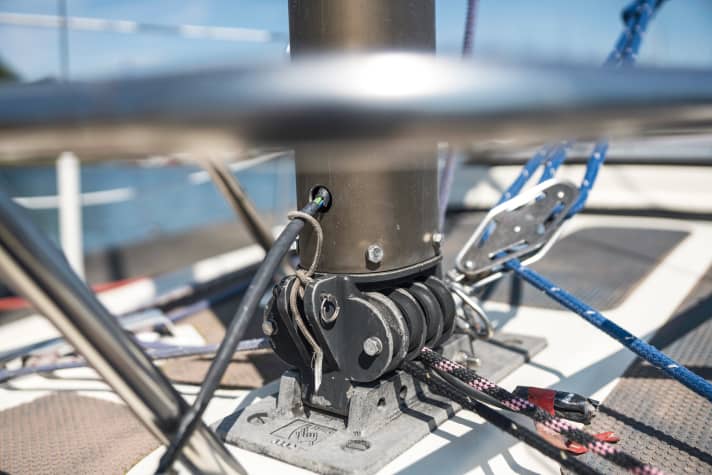
The boat also needs to be prepared for the upcoming journey below deck. A gimbal suspension and pot holder for the cooker are on the wish list, but this does not pose any major problems for the locksmith.
The upholstery has already been reupholstered in-house. Müller has even come up with a fastening system for the backrest upholstery that makes it possible to quickly access the many storage spaces behind it. Thanks to spring-loaded cords, as known from ski passes, the upholstery now snaps back into place automatically. The electric pod drive has also already proved its worth. For the Mediterranean, however, an additional 10 hp outboard motor is fitted to the stern.
Müller also prepares the boat for the trailer journey: "The previous owner had weighed the boat together with the aluminium trailer, but unfortunately it was only six kilograms short of the permissible total weight. That's why the anchor chain is put in the car on the journey.
For Kevin Müller, the Bavaria 707 was a stroke of luck. Motivated by the original pandemic idea, he also followed his new passion professionally this summer and took over a boat service.
Model history and construction of the Bavaria 707
Around 520 units of the Bavaria 707 were built between 1978 and 1985, all laminated alternately with mats and roving. At the time, the shipyard gave a 5-year guarantee on all GRP parts. Bulkheads and stringers are laminated, the 28 mm sandwich deck has Conticell inserts
Market situation
According to the concept of the sailing weekend cottage, many used boats still have sails, running and standing rigging from the year of construction. However, the option of trailering, which was advertised at the time, was usually not utilised and so the substance of the used boats on offer is usually still good
You should pay attention to this
With the exception of osmosis damage, all repairs and modernisations are manageable in terms of cost and effort. The deck covering crumbles badly over the years, and blocks, discs and stoppers often need to be replaced. Otherwise, look out for hairline cracks and defective sandwich cores
Equipment and prices
- Standard price 1978: 26,480 DM
- Ready for holiday: DM 42,000
- Used price: € 2,500-15,000
The measured values of the Bavaria 707
Sailing performance
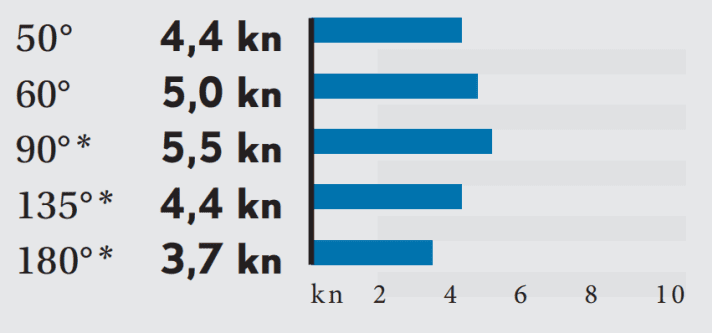
without drift/current; wind speed: 8 to 10 kn (3 Bft.), wave height: approx. 0.2 m * without spinnaker
Potential STZ = 4.7

The sail carrying capacity is typical for small boats with a large genoa. The speeds achieved are average
Dimensionless number. Calculation: 2√S/3√V. The higher the value, the more sail area (S) the ship has in relation to the displacement (V)
YACHT review of the Bavaria 707
The Bavaria 707 is a typical small cruiser of the 1970s with a lot of space for its size, which is really habitable thanks to its well thought-out interior and also impresses with its sailing performance
Design and concept
- + cosy back deck concept
- + Very functional lifting roof
- + very easy to trailer today
Sailing performance and trim
- + Rather stiff, luffing in position
- + simple, functional rig
- - Large top cannot be removed
Living and finishing quality
- + large bunks up to 210 cm long
- + very numerous storage compartments
- - Footwell dinette outdoor seating
Equipment and technology
- + Brand fittings ex shipyard
- + dedicated GRP production
- - Fittings often worth refitting
The Bavaria 707 in detail
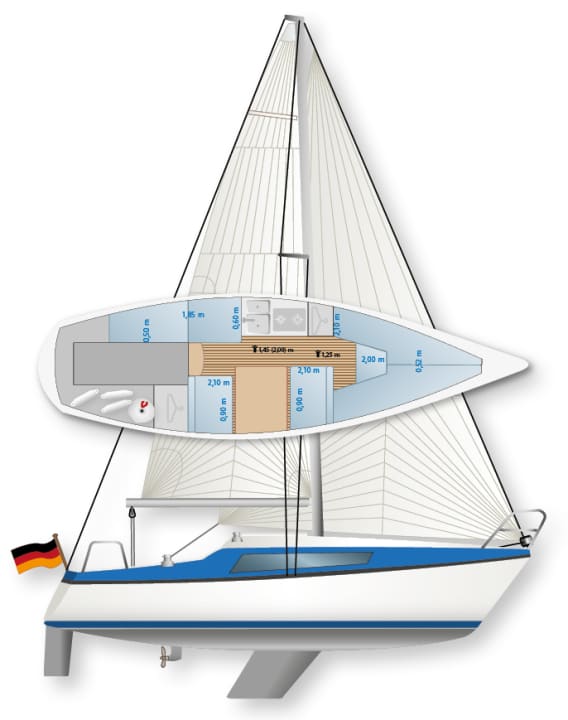
- Designers: Kurt W. Schröter, Willi Bilharz (inside)
- Total length: 7,07 m
- Waterline length: 5,94 m
- Width: 2,48 m
- Draught/alternative: 1,25
- Hull speed: 5.9 kn
- Weight: 1,5 t
- Ballast/proportion: 0,3 t/20 %
- Mainsail: 11,4 m2
- Fock/Genua: 12,2/19,5 m²
- Spinnaker: 35 m²
- Original engine: 7.5 kW/5.5 hp
- Motor test boat (electric): 6 kW
Trailerable small cruisers of comparable size on the used boat market
Varianta 65
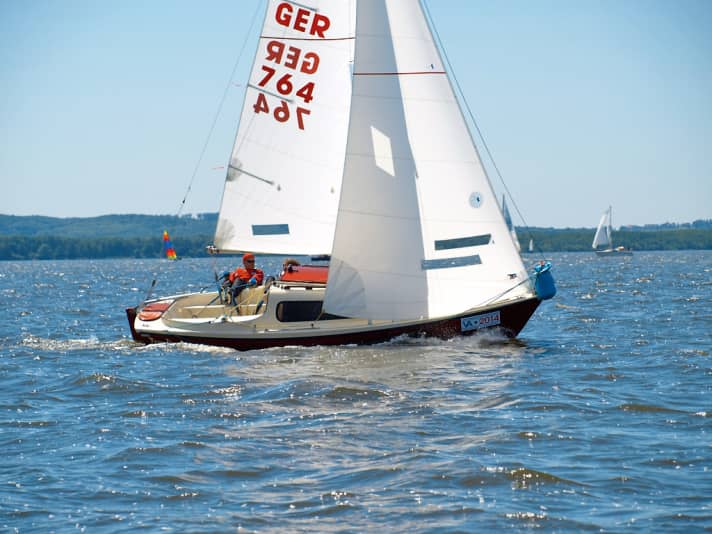
Compared to the older K4, the "65" model has a self-draining cockpit, higher coaming and a larger cabin. There is a very active class association and several class regattas.
- Hull length 6.50 m
- Width 2.10 m
- Weight 0.76 t
- from 1,000 euros
Etap 23
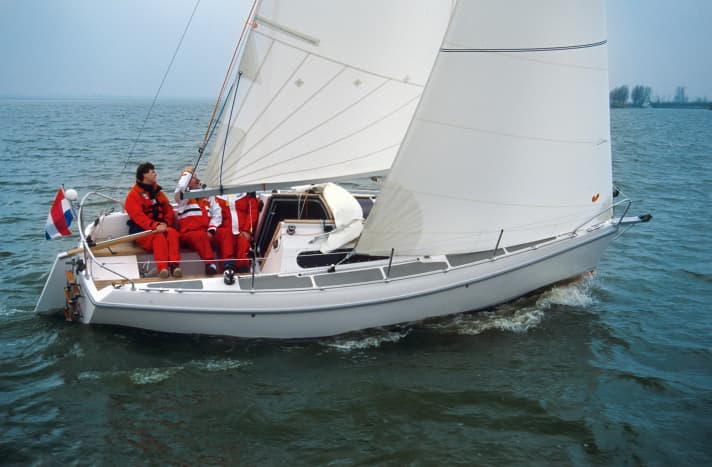
The brand essence of the shipyard, which no longer exists today, included the unsinkability of all units; the foaming also benefited the small boats as a good side effect of the insulation.
- Hull length 7.36 m
- Width 2.49 m
- Weight 1.5 tonnes
- from 15,000 euros
Dehlya 22
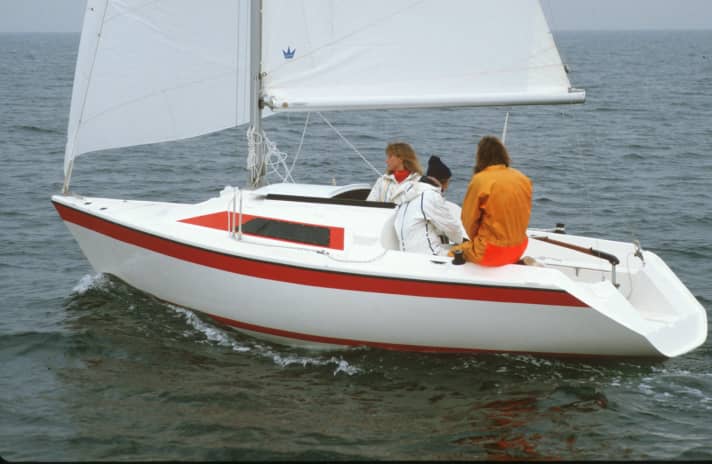
Designed as a self-build boat and, with the slip carriage and low weight, very much geared towards trailer transport. A water ballast ensures stability when sailing. Large owner community.
- Hull length 6.60 m
- Width 2.40 m
- Weight 0.95 t
- from 7,000 euros
First 20
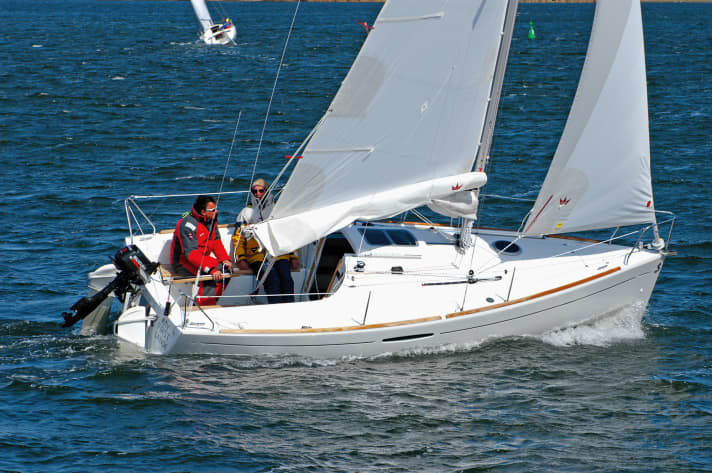
Various model series were created over 20 years: 21, 211, 21.7, 21.7S and the 20, now with a flared mainsail head. It was one of the first with twin rudders and a swing keel, suitable for tide.
- Hull length 6.40 m
- Width 2.48 m
- Weight 1.25 tonnes
- from 14,000 euros

